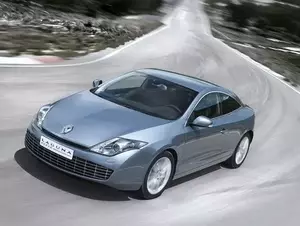
| Vehicle | Precise engine size | Difference from world average | Engine size to consumption ratio | Horsepower from 1 L | Engine size to 100 kg of weight |
|---|---|---|---|---|---|
| 2.0 dCi |
2 L (1995 cc) |
15% smaller | 50 cc to 1 mpg | 75 hp from 1 L | 133 cc to 100 kg |
| 2.0 Turbo |
2 L (1998 cc) |
14.8% smaller | 69 cc to 1 mpg | 102 hp from 1 L | 143 cc to 100 kg |
| 3.5 V6 |
3.5 L (3498 cc) |
49.1% bigger | 146 cc to 1 mpg | 68 hp from 1 L | 233 cc to 100 kg |
| 3.0 V6 dCi |
2.99 L (2993 cc) |
27.6% bigger | 91 cc to 1 mpg | 79 hp from 1 L | 187 cc to 100 kg |
| Vehicle | 2.0 dCi |
|---|---|
| Precise engine size | 2 L (1995 cc) |
| Difference from world average | 15 smaller |
| Engine size to consumption ratio | 50 cc to 1 mpg |
| Horsepower from 1 L | 75 hp from 1 L |
| Engine size to 100 kg of weight | 133 cc to 100 kg |
| Vehicle | 2.0 Turbo |
| Precise engine size | 2 L (1998 cc) |
| Difference from world average | 14.8 smaller |
| Engine size to consumption ratio | 69 cc to 1 mpg |
| Horsepower from 1 L | 102 hp from 1 L |
| Engine size to 100 kg of weight | 143 cc to 100 kg |
| Vehicle | 3.5 V6 |
| Precise engine size | 3.5 L (3498 cc) |
| Difference from world average | 49.1 bigger |
| Engine size to consumption ratio | 146 cc to 1 mpg |
| Horsepower from 1 L | 68 hp from 1 L |
| Engine size to 100 kg of weight | 233 cc to 100 kg |
| Vehicle | 3.0 V6 dCi |
| Precise engine size | 2.99 L (2993 cc) |
| Difference from world average | 27.6 bigger |
| Engine size to consumption ratio | 91 cc to 1 mpg |
| Horsepower from 1 L | 79 hp from 1 L |
| Engine size to 100 kg of weight | 187 cc to 100 kg |

| Vehicle | Precise engine size | Difference from world average | Engine size to consumption ratio | Horsepower from 1 L | Engine size to 100 kg of weight |
|---|---|---|---|---|---|
| 2.0 dCi |
2 L (1995 cc) |
15% smaller | 39 cc to 1 mpg | 65 hp from 1 L | 133 cc to 100 kg |
| GT 2.0 dCi |
2 L (1995 cc) |
15% smaller | 39 cc to 1 mpg | 75 hp from 1 L | 133 cc to 100 kg |
| 1.5 dCi |
1.46 L (1461 cc) |
37.7% smaller | 27 cc to 1 mpg | 75 hp from 1 L | 104 cc to 100 kg |
| 2.0 16V |
2 L (1997 cc) |
14.9% smaller | 64 cc to 1 mpg | 70 hp from 1 L | 143 cc to 100 kg |
| Vehicle | 2.0 dCi |
|---|---|
| Precise engine size | 2 L (1995 cc) |
| Difference from world average | 15 smaller |
| Engine size to consumption ratio | 39 cc to 1 mpg |
| Horsepower from 1 L | 65 hp from 1 L |
| Engine size to 100 kg of weight | 133 cc to 100 kg |
| Vehicle | GT 2.0 dCi |
| Precise engine size | 2 L (1995 cc) |
| Difference from world average | 15 smaller |
| Engine size to consumption ratio | 39 cc to 1 mpg |
| Horsepower from 1 L | 75 hp from 1 L |
| Engine size to 100 kg of weight | 133 cc to 100 kg |
| Vehicle | 1.5 dCi |
| Precise engine size | 1.46 L (1461 cc) |
| Difference from world average | 37.7 smaller |
| Engine size to consumption ratio | 27 cc to 1 mpg |
| Horsepower from 1 L | 75 hp from 1 L |
| Engine size to 100 kg of weight | 104 cc to 100 kg |
| Vehicle | 2.0 16V |
| Precise engine size | 2 L (1997 cc) |
| Difference from world average | 14.9 smaller |
| Engine size to consumption ratio | 64 cc to 1 mpg |
| Horsepower from 1 L | 70 hp from 1 L |
| Engine size to 100 kg of weight | 143 cc to 100 kg |
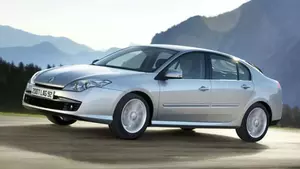
| Vehicle | Precise engine size | Difference from world average | Engine size to consumption ratio | Horsepower from 1 L | Engine size to 100 kg of weight |
|---|---|---|---|---|---|
| GT 2.0 dCi |
2 L (1995 cc) |
15% smaller | 38 cc to 1 mpg | 75 hp from 1 L | 133 cc to 100 kg |
| 2.0 dCi |
2 L (1995 cc) |
15% smaller | 49 cc to 1 mpg | 88 hp from 1 L | 133 cc to 100 kg |
| 2.0 16V |
2 L (1997 cc) |
14.9% smaller | 64 cc to 1 mpg | 70 hp from 1 L | 154 cc to 100 kg |
| 1.5 dCi |
1.46 L (1461 cc) |
37.7% smaller | 27 cc to 1 mpg | 75 hp from 1 L | 104 cc to 100 kg |
| Vehicle | GT 2.0 dCi |
|---|---|
| Precise engine size | 2 L (1995 cc) |
| Difference from world average | 15 smaller |
| Engine size to consumption ratio | 38 cc to 1 mpg |
| Horsepower from 1 L | 75 hp from 1 L |
| Engine size to 100 kg of weight | 133 cc to 100 kg |
| Vehicle | 2.0 dCi |
| Precise engine size | 2 L (1995 cc) |
| Difference from world average | 15 smaller |
| Engine size to consumption ratio | 49 cc to 1 mpg |
| Horsepower from 1 L | 88 hp from 1 L |
| Engine size to 100 kg of weight | 133 cc to 100 kg |
| Vehicle | 2.0 16V |
| Precise engine size | 2 L (1997 cc) |
| Difference from world average | 14.9 smaller |
| Engine size to consumption ratio | 64 cc to 1 mpg |
| Horsepower from 1 L | 70 hp from 1 L |
| Engine size to 100 kg of weight | 154 cc to 100 kg |
| Vehicle | 1.5 dCi |
| Precise engine size | 1.46 L (1461 cc) |
| Difference from world average | 37.7 smaller |
| Engine size to consumption ratio | 27 cc to 1 mpg |
| Horsepower from 1 L | 75 hp from 1 L |
| Engine size to 100 kg of weight | 104 cc to 100 kg |
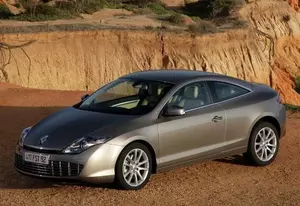
| Vehicle | Precise engine size | Difference from world average | Engine size to consumption ratio | Horsepower from 1 L | Engine size to 100 kg of weight |
|---|---|---|---|---|---|
| 2.0 16V Turbo |
2 L (1998 cc) |
14.8% smaller | 69 cc to 1 mpg | 103 hp from 1 L | 133 cc to 100 kg |
| 2.0 dCi FAP |
2 L (1995 cc) |
15% smaller | 59 cc to 1 mpg | 75 hp from 1 L | 125 cc to 100 kg |
| 3.0 dCi V6 FAP |
2.99 L (2993 cc) |
27.6% bigger | 97 cc to 1 mpg | 79 hp from 1 L | 176 cc to 100 kg |
| 3.5 V6 24V |
3.5 L (3498 cc) |
49.1% bigger | 152 cc to 1 mpg | 68 hp from 1 L | 219 cc to 100 kg |
| Vehicle | 2.0 16V Turbo |
|---|---|
| Precise engine size | 2 L (1998 cc) |
| Difference from world average | 14.8 smaller |
| Engine size to consumption ratio | 69 cc to 1 mpg |
| Horsepower from 1 L | 103 hp from 1 L |
| Engine size to 100 kg of weight | 133 cc to 100 kg |
| Vehicle | 2.0 dCi FAP |
| Precise engine size | 2 L (1995 cc) |
| Difference from world average | 15 smaller |
| Engine size to consumption ratio | 59 cc to 1 mpg |
| Horsepower from 1 L | 75 hp from 1 L |
| Engine size to 100 kg of weight | 125 cc to 100 kg |
| Vehicle | 3.0 dCi V6 FAP |
| Precise engine size | 2.99 L (2993 cc) |
| Difference from world average | 27.6 bigger |
| Engine size to consumption ratio | 97 cc to 1 mpg |
| Horsepower from 1 L | 79 hp from 1 L |
| Engine size to 100 kg of weight | 176 cc to 100 kg |
| Vehicle | 3.5 V6 24V |
| Precise engine size | 3.5 L (3498 cc) |
| Difference from world average | 49.1 bigger |
| Engine size to consumption ratio | 152 cc to 1 mpg |
| Horsepower from 1 L | 68 hp from 1 L |
| Engine size to 100 kg of weight | 219 cc to 100 kg |
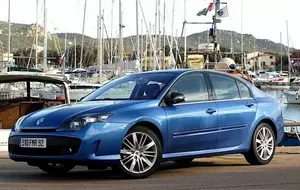
| Vehicle | Precise engine size | Difference from world average | Engine size to consumption ratio | Horsepower from 1 L | Engine size to 100 kg of weight |
|---|---|---|---|---|---|
| 1.5 dCi |
1.46 L (1461 cc) |
37.7% smaller | 32 cc to 1 mpg | 75 hp from 1 L | 97 cc to 100 kg |
| 1.6 16V |
1.6 L (1598 cc) |
31.9% smaller | 53 cc to 1 mpg | 69 hp from 1 L | 114 cc to 100 kg |
| 2.0 16V |
2 L (1997 cc) |
14.9% smaller | 67 cc to 1 mpg | 70 hp from 1 L | 143 cc to 100 kg |
| 2.0 dCi FAP |
2 L (1995 cc) |
15% smaller | 55 cc to 1 mpg | 87 hp from 1 L | 125 cc to 100 kg |
| 2.0 16V Turbo |
2 L (1998 cc) |
14.8% smaller | 77 cc to 1 mpg | 85 hp from 1 L | 133 cc to 100 kg |
| 2.0 dCi FAP Turbo |
2 L (1995 cc) |
15% smaller | 55 cc to 1 mpg | 87 hp from 1 L | 125 cc to 100 kg |
| Vehicle | 1.5 dCi |
|---|---|
| Precise engine size | 1.46 L (1461 cc) |
| Difference from world average | 37.7 smaller |
| Engine size to consumption ratio | 32 cc to 1 mpg |
| Horsepower from 1 L | 75 hp from 1 L |
| Engine size to 100 kg of weight | 97 cc to 100 kg |
| Vehicle | 1.6 16V |
| Precise engine size | 1.6 L (1598 cc) |
| Difference from world average | 31.9 smaller |
| Engine size to consumption ratio | 53 cc to 1 mpg |
| Horsepower from 1 L | 69 hp from 1 L |
| Engine size to 100 kg of weight | 114 cc to 100 kg |
| Vehicle | 2.0 16V |
| Precise engine size | 2 L (1997 cc) |
| Difference from world average | 14.9 smaller |
| Engine size to consumption ratio | 67 cc to 1 mpg |
| Horsepower from 1 L | 70 hp from 1 L |
| Engine size to 100 kg of weight | 143 cc to 100 kg |
| Vehicle | 2.0 dCi FAP |
| Precise engine size | 2 L (1995 cc) |
| Difference from world average | 15 smaller |
| Engine size to consumption ratio | 55 cc to 1 mpg |
| Horsepower from 1 L | 87 hp from 1 L |
| Engine size to 100 kg of weight | 125 cc to 100 kg |
| Vehicle | 2.0 16V Turbo |
| Precise engine size | 2 L (1998 cc) |
| Difference from world average | 14.8 smaller |
| Engine size to consumption ratio | 77 cc to 1 mpg |
| Horsepower from 1 L | 85 hp from 1 L |
| Engine size to 100 kg of weight | 133 cc to 100 kg |
| Vehicle | 2.0 dCi FAP Turbo |
| Precise engine size | 2 L (1995 cc) |
| Difference from world average | 15 smaller |
| Engine size to consumption ratio | 55 cc to 1 mpg |
| Horsepower from 1 L | 87 hp from 1 L |
| Engine size to 100 kg of weight | 125 cc to 100 kg |
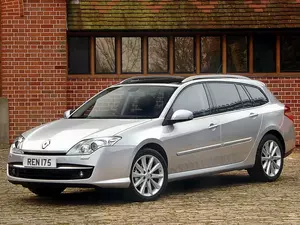
| Vehicle | Precise engine size | Difference from world average | Engine size to consumption ratio | Horsepower from 1 L | Engine size to 100 kg of weight |
|---|---|---|---|---|---|
| 2,0 16V |
2 L (1997 cc) |
14.9% smaller | 69 cc to 1 mpg | 70 hp from 1 L | 133 cc to 100 kg |
| 1.6 i 16V |
1.6 L (1598 cc) |
31.9% smaller | 50 cc to 1 mpg | 72 hp from 1 L | 107 cc to 100 kg |
| 1.5 dCi |
1.46 L (1461 cc) |
37.7% smaller | 32 cc to 1 mpg | 75 hp from 1 L | 97 cc to 100 kg |
| 2.0 16V Turbo |
2 L (1998 cc) |
14.8% smaller | 77 cc to 1 mpg | 85 hp from 1 L | 125 cc to 100 kg |
| 2.0 dCi FAP |
2 L (1995 cc) |
15% smaller | 57 cc to 1 mpg | 89 hp from 1 L | 125 cc to 100 kg |
| Vehicle | 2,0 16V |
|---|---|
| Precise engine size | 2 L (1997 cc) |
| Difference from world average | 14.9 smaller |
| Engine size to consumption ratio | 69 cc to 1 mpg |
| Horsepower from 1 L | 70 hp from 1 L |
| Engine size to 100 kg of weight | 133 cc to 100 kg |
| Vehicle | 1.6 i 16V |
| Precise engine size | 1.6 L (1598 cc) |
| Difference from world average | 31.9 smaller |
| Engine size to consumption ratio | 50 cc to 1 mpg |
| Horsepower from 1 L | 72 hp from 1 L |
| Engine size to 100 kg of weight | 107 cc to 100 kg |
| Vehicle | 1.5 dCi |
| Precise engine size | 1.46 L (1461 cc) |
| Difference from world average | 37.7 smaller |
| Engine size to consumption ratio | 32 cc to 1 mpg |
| Horsepower from 1 L | 75 hp from 1 L |
| Engine size to 100 kg of weight | 97 cc to 100 kg |
| Vehicle | 2.0 16V Turbo |
| Precise engine size | 2 L (1998 cc) |
| Difference from world average | 14.8 smaller |
| Engine size to consumption ratio | 77 cc to 1 mpg |
| Horsepower from 1 L | 85 hp from 1 L |
| Engine size to 100 kg of weight | 125 cc to 100 kg |
| Vehicle | 2.0 dCi FAP |
| Precise engine size | 2 L (1995 cc) |
| Difference from world average | 15 smaller |
| Engine size to consumption ratio | 57 cc to 1 mpg |
| Horsepower from 1 L | 89 hp from 1 L |
| Engine size to 100 kg of weight | 125 cc to 100 kg |

| Vehicle | Precise engine size | Difference from world average | Engine size to consumption ratio | Horsepower from 1 L | Engine size to 100 kg of weight |
|---|---|---|---|---|---|
| 2.2 dCi |
2.19 L (2188 cc) |
6.7% smaller | 59 cc to 1 mpg | 68 hp from 1 L | 146 cc to 100 kg |
| 1.5 dCi |
1.46 L (1461 cc) |
37.7% smaller | 29 cc to 1 mpg | 56 hp from 1 L | 112 cc to 100 kg |
| 1.6 i 16V |
1.6 L (1598 cc) |
31.9% smaller | - | 70 hp from 1 L | 123 cc to 100 kg |
| 1.8 16V |
1.78 L (1783 cc) |
24% smaller | 71 cc to 1 mpg | 67 hp from 1 L | 127 cc to 100 kg |
| 1.9 dCi |
1.87 L (1870 cc) |
20.3% smaller | 46 cc to 1 mpg | 64 hp from 1 L | 125 cc to 100 kg |
| 2.0 i 16V |
2 L (1998 cc) |
14.8% smaller | - | 68 hp from 1 L | 143 cc to 100 kg |
| 2.0 i 16V GT |
2 L (1998 cc) |
14.8% smaller | - | 102 hp from 1 L | 133 cc to 100 kg |
| 2.0 i T 16V |
2 L (1998 cc) |
14.8% smaller | 71 cc to 1 mpg | 83 hp from 1 L | 143 cc to 100 kg |
| 2.0 IDE 16V |
2 L (1998 cc) |
14.8% smaller | - | 70 hp from 1 L | 154 cc to 100 kg |
| 2.0 i 16V Turbo |
2 L (1998 cc) |
14.8% smaller | - | 85 hp from 1 L | 143 cc to 100 kg |
| 3.0 V6 24V |
2.95 L (2946 cc) |
25.6% bigger | 128 cc to 1 mpg | 70 hp from 1 L | 196 cc to 100 kg |
| Vehicle | 2.2 dCi |
|---|---|
| Precise engine size | 2.19 L (2188 cc) |
| Difference from world average | 6.7 smaller |
| Engine size to consumption ratio | 59 cc to 1 mpg |
| Horsepower from 1 L | 68 hp from 1 L |
| Engine size to 100 kg of weight | 146 cc to 100 kg |
| Vehicle | 1.5 dCi |
| Precise engine size | 1.46 L (1461 cc) |
| Difference from world average | 37.7 smaller |
| Engine size to consumption ratio | 29 cc to 1 mpg |
| Horsepower from 1 L | 56 hp from 1 L |
| Engine size to 100 kg of weight | 112 cc to 100 kg |
| Vehicle | 1.6 i 16V |
| Precise engine size | 1.6 L (1598 cc) |
| Difference from world average | 31.9 smaller |
| Engine size to consumption ratio | - |
| Horsepower from 1 L | 70 hp from 1 L |
| Engine size to 100 kg of weight | 123 cc to 100 kg |
| Vehicle | 1.8 16V |
| Precise engine size | 1.78 L (1783 cc) |
| Difference from world average | 24 smaller |
| Engine size to consumption ratio | 71 cc to 1 mpg |
| Horsepower from 1 L | 67 hp from 1 L |
| Engine size to 100 kg of weight | 127 cc to 100 kg |
| Vehicle | 1.9 dCi |
| Precise engine size | 1.87 L (1870 cc) |
| Difference from world average | 20.3 smaller |
| Engine size to consumption ratio | 46 cc to 1 mpg |
| Horsepower from 1 L | 64 hp from 1 L |
| Engine size to 100 kg of weight | 125 cc to 100 kg |
| Vehicle | 2.0 i 16V |
| Precise engine size | 2 L (1998 cc) |
| Difference from world average | 14.8 smaller |
| Engine size to consumption ratio | - |
| Horsepower from 1 L | 68 hp from 1 L |
| Engine size to 100 kg of weight | 143 cc to 100 kg |
| Vehicle | 2.0 i 16V GT |
| Precise engine size | 2 L (1998 cc) |
| Difference from world average | 14.8 smaller |
| Engine size to consumption ratio | - |
| Horsepower from 1 L | 102 hp from 1 L |
| Engine size to 100 kg of weight | 133 cc to 100 kg |
| Vehicle | 2.0 i T 16V |
| Precise engine size | 2 L (1998 cc) |
| Difference from world average | 14.8 smaller |
| Engine size to consumption ratio | 71 cc to 1 mpg |
| Horsepower from 1 L | 83 hp from 1 L |
| Engine size to 100 kg of weight | 143 cc to 100 kg |
| Vehicle | 2.0 IDE 16V |
| Precise engine size | 2 L (1998 cc) |
| Difference from world average | 14.8 smaller |
| Engine size to consumption ratio | - |
| Horsepower from 1 L | 70 hp from 1 L |
| Engine size to 100 kg of weight | 154 cc to 100 kg |
| Vehicle | 2.0 i 16V Turbo |
| Precise engine size | 2 L (1998 cc) |
| Difference from world average | 14.8 smaller |
| Engine size to consumption ratio | - |
| Horsepower from 1 L | 85 hp from 1 L |
| Engine size to 100 kg of weight | 143 cc to 100 kg |
| Vehicle | 3.0 V6 24V |
| Precise engine size | 2.95 L (2946 cc) |
| Difference from world average | 25.6 bigger |
| Engine size to consumption ratio | 128 cc to 1 mpg |
| Horsepower from 1 L | 70 hp from 1 L |
| Engine size to 100 kg of weight | 196 cc to 100 kg |

| Vehicle | Precise engine size | Difference from world average | Engine size to consumption ratio | Horsepower from 1 L | Engine size to 100 kg of weight |
|---|---|---|---|---|---|
| 2.0i 16V |
2 L (1998 cc) |
14.8% smaller | - | 68 hp from 1 L | 154 cc to 100 kg |
| 2.0i 16V Turbo |
2 L (1998 cc) |
14.8% smaller | - | 85 hp from 1 L | 154 cc to 100 kg |
| 2.2 dCi |
2.19 L (2188 cc) |
6.7% smaller | 59 cc to 1 mpg | 68 hp from 1 L | 146 cc to 100 kg |
| 1.6 i 16V |
1.6 L (1598 cc) |
31.9% smaller | 50 cc to 1 mpg | 67 hp from 1 L | 123 cc to 100 kg |
| 1.9 dCi |
1.87 L (1870 cc) |
20.3% smaller | 45 cc to 1 mpg | 64 hp from 1 L | 134 cc to 100 kg |
| 1.8 16V |
1.78 L (1783 cc) |
24% smaller | 58 cc to 1 mpg | 67 hp from 1 L | 127 cc to 100 kg |
| 2.0 i 16V GT |
2 L (1998 cc) |
14.8% smaller | - | 102 hp from 1 L | 154 cc to 100 kg |
| 2.0 IDE 16V |
2 L (1998 cc) |
14.8% smaller | - | 70 hp from 1 L | 154 cc to 100 kg |
| 2.0 i T 16V |
2 L (1998 cc) |
14.8% smaller | 69 cc to 1 mpg | 83 hp from 1 L | 143 cc to 100 kg |
| 3.0 V6 24V |
2.95 L (2946 cc) |
25.6% bigger | 128 cc to 1 mpg | 70 hp from 1 L | 196 cc to 100 kg |
| Vehicle | 2.0i 16V |
|---|---|
| Precise engine size | 2 L (1998 cc) |
| Difference from world average | 14.8 smaller |
| Engine size to consumption ratio | - |
| Horsepower from 1 L | 68 hp from 1 L |
| Engine size to 100 kg of weight | 154 cc to 100 kg |
| Vehicle | 2.0i 16V Turbo |
| Precise engine size | 2 L (1998 cc) |
| Difference from world average | 14.8 smaller |
| Engine size to consumption ratio | - |
| Horsepower from 1 L | 85 hp from 1 L |
| Engine size to 100 kg of weight | 154 cc to 100 kg |
| Vehicle | 2.2 dCi |
| Precise engine size | 2.19 L (2188 cc) |
| Difference from world average | 6.7 smaller |
| Engine size to consumption ratio | 59 cc to 1 mpg |
| Horsepower from 1 L | 68 hp from 1 L |
| Engine size to 100 kg of weight | 146 cc to 100 kg |
| Vehicle | 1.6 i 16V |
| Precise engine size | 1.6 L (1598 cc) |
| Difference from world average | 31.9 smaller |
| Engine size to consumption ratio | 50 cc to 1 mpg |
| Horsepower from 1 L | 67 hp from 1 L |
| Engine size to 100 kg of weight | 123 cc to 100 kg |
| Vehicle | 1.9 dCi |
| Precise engine size | 1.87 L (1870 cc) |
| Difference from world average | 20.3 smaller |
| Engine size to consumption ratio | 45 cc to 1 mpg |
| Horsepower from 1 L | 64 hp from 1 L |
| Engine size to 100 kg of weight | 134 cc to 100 kg |
| Vehicle | 1.8 16V |
| Precise engine size | 1.78 L (1783 cc) |
| Difference from world average | 24 smaller |
| Engine size to consumption ratio | 58 cc to 1 mpg |
| Horsepower from 1 L | 67 hp from 1 L |
| Engine size to 100 kg of weight | 127 cc to 100 kg |
| Vehicle | 2.0 i 16V GT |
| Precise engine size | 2 L (1998 cc) |
| Difference from world average | 14.8 smaller |
| Engine size to consumption ratio | - |
| Horsepower from 1 L | 102 hp from 1 L |
| Engine size to 100 kg of weight | 154 cc to 100 kg |
| Vehicle | 2.0 IDE 16V |
| Precise engine size | 2 L (1998 cc) |
| Difference from world average | 14.8 smaller |
| Engine size to consumption ratio | - |
| Horsepower from 1 L | 70 hp from 1 L |
| Engine size to 100 kg of weight | 154 cc to 100 kg |
| Vehicle | 2.0 i T 16V |
| Precise engine size | 2 L (1998 cc) |
| Difference from world average | 14.8 smaller |
| Engine size to consumption ratio | 69 cc to 1 mpg |
| Horsepower from 1 L | 83 hp from 1 L |
| Engine size to 100 kg of weight | 143 cc to 100 kg |
| Vehicle | 3.0 V6 24V |
| Precise engine size | 2.95 L (2946 cc) |
| Difference from world average | 25.6 bigger |
| Engine size to consumption ratio | 128 cc to 1 mpg |
| Horsepower from 1 L | 70 hp from 1 L |
| Engine size to 100 kg of weight | 196 cc to 100 kg |

| Vehicle | Precise engine size | Difference from world average | Engine size to consumption ratio | Horsepower from 1 L | Engine size to 100 kg of weight |
|---|---|---|---|---|---|
| 1.6 i 16V |
1.6 L (1598 cc) |
31.9% smaller | 47 cc to 1 mpg | 67 hp from 1 L | 123 cc to 100 kg |
| 1.8 |
1.78 L (1783 cc) |
24% smaller | 64 cc to 1 mpg | 51 hp from 1 L | 127 cc to 100 kg |
| 1.8 16V |
1.78 L (1783 cc) |
24% smaller | - | 67 hp from 1 L | 137 cc to 100 kg |
| 1.9 dCi |
1.87 L (1870 cc) |
20.3% smaller | - | 58 hp from 1 L | 134 cc to 100 kg |
| 1.9 dTi |
1.87 L (1870 cc) |
20.3% smaller | 43 cc to 1 mpg | 52 hp from 1 L | 134 cc to 100 kg |
| 2.0 |
2 L (1998 cc) |
14.8% smaller | 74 cc to 1 mpg | 57 hp from 1 L | 143 cc to 100 kg |
| 2.0 16V |
1.95 L (1948 cc) |
17% smaller | - | 71 hp from 1 L | 139 cc to 100 kg |
| 2.2 D |
2.19 L (2188 cc) |
6.7% smaller | 51 cc to 1 mpg | 38 hp from 1 L | 146 cc to 100 kg |
| 2.2 dT |
2.19 L (2188 cc) |
6.7% smaller | - | 52 hp from 1 L | 146 cc to 100 kg |
| 2.9 24V |
2.95 L (2946 cc) |
25.6% bigger | - | 64 hp from 1 L | 210 cc to 100 kg |
| 3.0 |
2.96 L (2963 cc) |
26.3% bigger | 148 cc to 1 mpg | 56 hp from 1 L | 198 cc to 100 kg |
| Vehicle | 1.6 i 16V |
|---|---|
| Precise engine size | 1.6 L (1598 cc) |
| Difference from world average | 31.9 smaller |
| Engine size to consumption ratio | 47 cc to 1 mpg |
| Horsepower from 1 L | 67 hp from 1 L |
| Engine size to 100 kg of weight | 123 cc to 100 kg |
| Vehicle | 1.8 |
| Precise engine size | 1.78 L (1783 cc) |
| Difference from world average | 24 smaller |
| Engine size to consumption ratio | 64 cc to 1 mpg |
| Horsepower from 1 L | 51 hp from 1 L |
| Engine size to 100 kg of weight | 127 cc to 100 kg |
| Vehicle | 1.8 16V |
| Precise engine size | 1.78 L (1783 cc) |
| Difference from world average | 24 smaller |
| Engine size to consumption ratio | - |
| Horsepower from 1 L | 67 hp from 1 L |
| Engine size to 100 kg of weight | 137 cc to 100 kg |
| Vehicle | 1.9 dCi |
| Precise engine size | 1.87 L (1870 cc) |
| Difference from world average | 20.3 smaller |
| Engine size to consumption ratio | - |
| Horsepower from 1 L | 58 hp from 1 L |
| Engine size to 100 kg of weight | 134 cc to 100 kg |
| Vehicle | 1.9 dTi |
| Precise engine size | 1.87 L (1870 cc) |
| Difference from world average | 20.3 smaller |
| Engine size to consumption ratio | 43 cc to 1 mpg |
| Horsepower from 1 L | 52 hp from 1 L |
| Engine size to 100 kg of weight | 134 cc to 100 kg |
| Vehicle | 2.0 |
| Precise engine size | 2 L (1998 cc) |
| Difference from world average | 14.8 smaller |
| Engine size to consumption ratio | 74 cc to 1 mpg |
| Horsepower from 1 L | 57 hp from 1 L |
| Engine size to 100 kg of weight | 143 cc to 100 kg |
| Vehicle | 2.0 16V |
| Precise engine size | 1.95 L (1948 cc) |
| Difference from world average | 17 smaller |
| Engine size to consumption ratio | - |
| Horsepower from 1 L | 71 hp from 1 L |
| Engine size to 100 kg of weight | 139 cc to 100 kg |
| Vehicle | 2.2 D |
| Precise engine size | 2.19 L (2188 cc) |
| Difference from world average | 6.7 smaller |
| Engine size to consumption ratio | 51 cc to 1 mpg |
| Horsepower from 1 L | 38 hp from 1 L |
| Engine size to 100 kg of weight | 146 cc to 100 kg |
| Vehicle | 2.2 dT |
| Precise engine size | 2.19 L (2188 cc) |
| Difference from world average | 6.7 smaller |
| Engine size to consumption ratio | - |
| Horsepower from 1 L | 52 hp from 1 L |
| Engine size to 100 kg of weight | 146 cc to 100 kg |
| Vehicle | 2.9 24V |
| Precise engine size | 2.95 L (2946 cc) |
| Difference from world average | 25.6 bigger |
| Engine size to consumption ratio | - |
| Horsepower from 1 L | 64 hp from 1 L |
| Engine size to 100 kg of weight | 210 cc to 100 kg |
| Vehicle | 3.0 |
| Precise engine size | 2.96 L (2963 cc) |
| Difference from world average | 26.3 bigger |
| Engine size to consumption ratio | 148 cc to 1 mpg |
| Horsepower from 1 L | 56 hp from 1 L |
| Engine size to 100 kg of weight | 198 cc to 100 kg |

| Vehicle | Precise engine size | Difference from world average | Engine size to consumption ratio | Horsepower from 1 L | Engine size to 100 kg of weight |
|---|---|---|---|---|---|
| 2.9 24V |
2.95 L (2946 cc) |
25.6% bigger | - | 64 hp from 1 L | 210 cc to 100 kg |
| 1.6 i 16V |
1.6 L (1598 cc) |
31.9% smaller | - | 67 hp from 1 L | 133 cc to 100 kg |
| 1.8 16V |
1.78 L (1783 cc) |
24% smaller | 59 cc to 1 mpg | 67 hp from 1 L | 149 cc to 100 kg |
| 1.9 dTi |
1.87 L (1870 cc) |
20.3% smaller | - | 52 hp from 1 L | 134 cc to 100 kg |
| 1.8 |
1.79 L (1794 cc) |
23.5% smaller | 64 cc to 1 mpg | 50 hp from 1 L | 150 cc to 100 kg |
| 2.0 |
2 L (1998 cc) |
14.8% smaller | 71 cc to 1 mpg | 57 hp from 1 L | 154 cc to 100 kg |
| 2.0 16V |
1.95 L (1948 cc) |
17% smaller | - | 71 hp from 1 L | 150 cc to 100 kg |
| 2.0 i 16V |
2 L (1998 cc) |
14.8% smaller | 71 cc to 1 mpg | 70 hp from 1 L | 154 cc to 100 kg |
| 2.2 D |
2.19 L (2188 cc) |
6.7% smaller | 61 cc to 1 mpg | 38 hp from 1 L | 168 cc to 100 kg |
| 2.2 dT |
2.19 L (2188 cc) |
6.7% smaller | - | 52 hp from 1 L | 156 cc to 100 kg |
| 3.0 V6 RXE |
2.96 L (2963 cc) |
26.3% bigger | 141 cc to 1 mpg | 57 hp from 1 L | 212 cc to 100 kg |
| 3.0 |
2.96 L (2963 cc) |
26.3% bigger | 141 cc to 1 mpg | 56 hp from 1 L | 212 cc to 100 kg |
| Vehicle | 2.9 24V |
|---|---|
| Precise engine size | 2.95 L (2946 cc) |
| Difference from world average | 25.6 bigger |
| Engine size to consumption ratio | - |
| Horsepower from 1 L | 64 hp from 1 L |
| Engine size to 100 kg of weight | 210 cc to 100 kg |
| Vehicle | 1.6 i 16V |
| Precise engine size | 1.6 L (1598 cc) |
| Difference from world average | 31.9 smaller |
| Engine size to consumption ratio | - |
| Horsepower from 1 L | 67 hp from 1 L |
| Engine size to 100 kg of weight | 133 cc to 100 kg |
| Vehicle | 1.8 16V |
| Precise engine size | 1.78 L (1783 cc) |
| Difference from world average | 24 smaller |
| Engine size to consumption ratio | 59 cc to 1 mpg |
| Horsepower from 1 L | 67 hp from 1 L |
| Engine size to 100 kg of weight | 149 cc to 100 kg |
| Vehicle | 1.9 dTi |
| Precise engine size | 1.87 L (1870 cc) |
| Difference from world average | 20.3 smaller |
| Engine size to consumption ratio | - |
| Horsepower from 1 L | 52 hp from 1 L |
| Engine size to 100 kg of weight | 134 cc to 100 kg |
| Vehicle | 1.8 |
| Precise engine size | 1.79 L (1794 cc) |
| Difference from world average | 23.5 smaller |
| Engine size to consumption ratio | 64 cc to 1 mpg |
| Horsepower from 1 L | 50 hp from 1 L |
| Engine size to 100 kg of weight | 150 cc to 100 kg |
| Vehicle | 2.0 |
| Precise engine size | 2 L (1998 cc) |
| Difference from world average | 14.8 smaller |
| Engine size to consumption ratio | 71 cc to 1 mpg |
| Horsepower from 1 L | 57 hp from 1 L |
| Engine size to 100 kg of weight | 154 cc to 100 kg |
| Vehicle | 2.0 16V |
| Precise engine size | 1.95 L (1948 cc) |
| Difference from world average | 17 smaller |
| Engine size to consumption ratio | - |
| Horsepower from 1 L | 71 hp from 1 L |
| Engine size to 100 kg of weight | 150 cc to 100 kg |
| Vehicle | 2.0 i 16V |
| Precise engine size | 2 L (1998 cc) |
| Difference from world average | 14.8 smaller |
| Engine size to consumption ratio | 71 cc to 1 mpg |
| Horsepower from 1 L | 70 hp from 1 L |
| Engine size to 100 kg of weight | 154 cc to 100 kg |
| Vehicle | 2.2 D |
| Precise engine size | 2.19 L (2188 cc) |
| Difference from world average | 6.7 smaller |
| Engine size to consumption ratio | 61 cc to 1 mpg |
| Horsepower from 1 L | 38 hp from 1 L |
| Engine size to 100 kg of weight | 168 cc to 100 kg |
| Vehicle | 2.2 dT |
| Precise engine size | 2.19 L (2188 cc) |
| Difference from world average | 6.7 smaller |
| Engine size to consumption ratio | - |
| Horsepower from 1 L | 52 hp from 1 L |
| Engine size to 100 kg of weight | 156 cc to 100 kg |
| Vehicle | 3.0 V6 RXE |
| Precise engine size | 2.96 L (2963 cc) |
| Difference from world average | 26.3 bigger |
| Engine size to consumption ratio | 141 cc to 1 mpg |
| Horsepower from 1 L | 57 hp from 1 L |
| Engine size to 100 kg of weight | 212 cc to 100 kg |
| Vehicle | 3.0 |
| Precise engine size | 2.96 L (2963 cc) |
| Difference from world average | 26.3 bigger |
| Engine size to consumption ratio | 141 cc to 1 mpg |
| Horsepower from 1 L | 56 hp from 1 L |
| Engine size to 100 kg of weight | 212 cc to 100 kg |